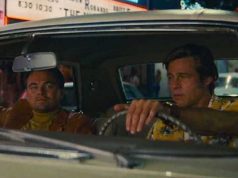Though his imitators’ films must number in the hundreds by now, Quentin Tarantino himself has made only seven features, and the latest, “Inglourious Basterds,” demonstrates what should be an obvious truth: No one does Tarantino better than Tarantino.
The gleefully hip dialogue that gushes from his brain is still a pleasure to hear — good thing, since it still gushes in 150-minute torrents. The only reason it doesn’t seem as fresh as, say, “Reservoir Dogs” and “Pulp Fiction” is that, well, it isn’t: “Basterds” has the disadvantage of not being Tarantino’s first movie. But the things you sign on for in a QT work — lengthy monologues, maiming, mutilation, cinephilia, and foot fetishism — are here in spades.
The title, misspelled in the style of the hillbilly character who coins it (and bearing no relation to the similarly titled 1978 film), refers to a group of U.S. Army soldiers who have made it their business to slaughter as many Nazis as they can while World War II rages in Europe. The eight original members of the squad are Jewish, making them personally invested. One of the later additions, Stiglitz (Til Schweiger), is German, recruited by the Basterds after he singlehandedly killed 13 of his fellow S.S. officers. The Inglourious Basterds admire that kind of spirit!
Their leader, Tennessee-born Lt. Aldo Raine (Brad Pitt), who bears a scar on his neck that suggests he may have been on the wrong end of a noose at some point, pursues killing Nazis (“Nat-sees”) with the enthusiasm of a kid in a sandbox. One of his favorite pastimes is to have Sgt. Donny Donowitz (Eli Roth), aka the Bear Jew, deploy a baseball bat against a Nazi’s skull while the other Basterds observe. “Watchin’ Donny beat Nat-sees to death is the closest we ever come to goin’ to the movies!” he declares.
The Basterds have successfully struck terror in the hearts of the Germans, with even Hitler himself (Martin Wuttke) eager to meet the Nazi officer who survived one of their attacks. (If they let you live, it’s only so you’ll serve as a warning to others. No one escapes from the Inglourious Basterds.) But the Nazis have their own fearsome weapon, too, in the form of Col. Hans Landa (Christoph Waltz), better known as the Jew Hunter.
Let me tell you about Col. Landa the Jew Hunter, and about Christoph Waltz, the Austrian actor who plays him. Landa is Tarantino’s greatest character since Samuel L. Jackson Jheri-curled his hair and yelled made-up Bible verses at deadbeats. He is terrifyingly pleasant as he asks a French dairy farmer questions about a missing Jewish family, who we know are hiding beneath the floorboards. Waltz plays the Jew Hunter to the hilt: funny, lighthearted, then frightening; serious and businesslike, then pulling out a comically oversized pipe to smoke. But Waltz is never campy — Col. Landa is larger than life but still lifelike, thoroughly captivating to watch every time he’s on the screen.
The Basterds and the Jew Hunter disappear for a while as the film moves to another subject, setting up for a convergence in the last act. In this other story, a beautiful young French Jew named Shosanna (Melanie Laurent) has escaped the Nazis, changed her name to Emmanuelle, and now operates a movie theater in occupied Paris. A Nazi soldier, Fredrick Zoller (Daniel Bruhl), takes a liking to her. Young and handsome, he’s a war hero (“the German Sgt. York”) and the subject of a rousing new Nazi propaganda film, “Nation’s Pride,” in which he plays himself. Because of his affection for Emmanuelle, he lobbies for the gala “Nation’s Pride” premiere to be held at her theater. All the major Nazi leaders will be in attendance, maybe even the Fuhrer himself. All those Nazis in one place at one time, and all that anger in the heart of the proprietress….
In typical Tarantino fashion, there are juicy cameos (Mike Myers as a British military strategist?) and major characters not introduced until late in the game, like British Lt. Hicox (Michael Fassbender) and German film-star-turned-traitor Bridget von Hammersmark (Diane Kruger). Lesser members of the Basterds team, including B.J. Novak from “The Office,” emerge in beefier roles as the multi-angled story builds toward its outrageous and insane climax.
Though Tarantino’s visual and verbal styles are his trademarks, his very best work is really all about story, not flair. The most entertaining aspect of “Inglourious Basterds,” as in “Pulp Fiction” and most of the others, is seeing what happens next. How it happens, and what the characters say while it happens, are less important — stylistic icing on the story cake. (Mmm… story cake….) And in this case, the story is wildly, daringly imaginative, the sort of thing that very few filmmakers could even conceive, let alone execute.
But apart from Col. Landa the Jew Hunter, none of the personalities in “Basterds” stand out as great characters — no, not even Lt. Aldo Raine. Brad Pitt is energetic and funny as the revenge-minded hillbilly, but it’s a one-note character, like a minor figure in a Coen brothers movie. Donny the Bear Jew has his moment in the sun and then fades from the film; most of the others come and go and do their business capably but not very memorably.
This is what prevents the movie from achieving true greatness. It’s loads of fun, to be sure, and certain sequences are as brilliantly enjoyable as anything Tarantino’s ever done. But who, in the end, are we meant to care about? We’re dying to see where the story will go, yes. Seeing where the characters wind up? Not so much.
B+ (2 hrs., 33 min.; )





